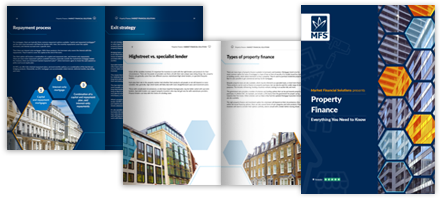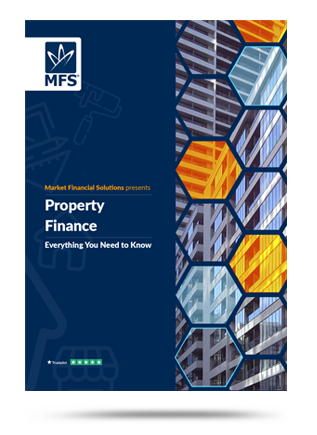Disclaimer
Market Financial Solutions are a bridging loan and buy-to-let mortgage provider, not financial advisors. Therefore, Investors are encouraged to seek professional advice. The information in this content is correct at time of writing.

Passive income has been a trending topic in the investment landscape in recent years. It seems many people are keen to supplement their income with additional revenue streams. This makes sense, considering the impact of the cost-of-living crisis.
There are many ways to achieve passive income[1]. Some are obvious, others are more niche. Shares which pay dividends can provide passive income, as can high-yielding savings accounts. But it’s also possible to generate income from content writing, renting out a parking space, and even publishing a digital course.
The question remains though, is it possible to generate passive income through property? This is a complicated question to answer, but we will tackle that complication in this blog.
What exactly is passive income through property?
Broadly, the answer to the question of is it possible to generate passive income through property is: kind of. The first thing that likely comes to mind is a standard BTL investment. A property is bought, rented out to a tenant, and landlord collects rent on a regular basis.
Whether this can be “passive” however is debateable. Passive income is that which is earned from completed work or an investment that requires little-to-no effort to manage or oversee.
In the property market, landlords can hand over day-to-day management to a service company that’ll oversee rent collection, tenant communication, and more. This can make the income generated more passive but ultimately, landlords will always have an obligation to make repairs, and ensure their properties are compliant with various regulations[2].
Also, certain types of property investments may be better suited for a more passive strategy over others. Student accommodation (HMOs specifically) may allow landlords to generate income from a higher number of tenants. Although, income levels may see a dip outside of term time.
Holiday lets may also see plenty of demand in the summer months, and practically sell themselves to holidaymakers. But once the colder months arrive, it may be harder to generate income.
What’s more, with tougher legislation looming, it may become harder to generate relative passive income through property. The Renters’ Right Bill is set to come into play this year and it will bring with it major changes. The kind that can’t be passively handled.
This bill, among other things, will abolish fixed-term assured tenancies, ban Section 21 evictions, and usher in Awaab’s Law[3]. The latter may prove especially seismic.
Awaab’s Law will force landlords to fix damp and mould within strict time limits[4]. There may be no time to continuingly liaise back and forth between renters, service companies, and landlords. BTL investors will need to embrace proactivity going forward.

Other ways to generate passive income through property
Perhaps, the only real way to get truly passive income through property is by investing in the market without directly owning an asset. A common way to do this is by investing in a REIT.
A Real Estate Investment Trust (REIT) is a type of investment fund whose portfolio is compromised of real estate holdings of private residences, and/or commercial properties. Real estate investment trust companies own and manage real estate properties to generate income for the underlying investors[5].
There are three main types of REITs: equity, mortgage, and hybrid. Equity REITs are the most common, and they own or directly invest in income-producing properties. Meanwhile, mortgage REITs invest in mortgages, buying either residential or commercial mortgage-backed securities (MBS), and hybrid REITs offer a combination of both equity and mortgage options.
Another, more complicated option may involve leasing to another investor or property company[6]. Here, the owner will lease their property to another investor on a long-term basis so they can then run it as an HMO, serviced accommodation, or other BTL asset. This can generate passive income, but the returns involved will likely be diminished.
Other indirect options for (potentially) generating passive income via property include[7]:
- Property unit trusts
- Property open-ended investment companies (OEICs)
- Property investment trusts
- Property bonds and loan notes
- Shares in listed property companies
- Peer-to-peer lending
Of course, Market Financial Solutions is not a financial advisor and cannot help with these kinds of strategies or options. We can only provide capital for acquisitions, refinancing, and/or renovations in the property market.
How much income can realistically be generated in the property market?
A direct investment in a UK residential BTL asset generated around £1,284 on average in December 2024, according to Zoopla’s latest data[8]. It also expects UK rents to rise by 3-4% over 2025.
But, if property investors can be selective, it’s possible to generate much higher income levels across the UK. According to analysis of Hamptons data[9], it’s possible to generate a gross yield of 11.1% in Blaenau Gwent, Wales, with as little as a £25,000 deposit. Other high yielding locations include County Durham (10.4%), Blackpool (10.1%), and Burnley (10.1%).
In fact, average yields across the UK recently hit a 13-year high of 6.93%[10]. Despite all the rhetoric in the press and market, it seems BTL investments can still be worth it, even if it’s tricky to generate passive income through property at all. As always, Market Financial Solutions is here to facilitate direct investment in the property market.
The Complete Guide to
Property Finance
Everything you need to know
- Foundation & different finance types
- Useful tools
- Apply them in real life
- Market insights & more
[1] https://www.nerdwallet.com/article/investing/what-is-passive-income-and-how-do-i-earn-it
[2] https://www.gov.uk/renting-out-a-property
[3] https://www.totallandlordinsurance.co.uk/knowledge-centre/what-does-labours-renters-rights-bill-mean-for-landlords
[4] https://www.gov.uk/government/news/government-to-deliver-awaabs-law
[5] https://blog.moneyfarm.com/en/saving-and-investments/real-estate-investment-trusts-etfs-uk/
[6] https://purseglove.co.uk/how-to-create-a-passive-income-through-property-investment/
[7] https://www.money.co.uk/guides/how-to-invest-in-property
[8] https://www.zoopla.co.uk/discover/property-news/rental-market-report/
[9] https://www.telegraph.co.uk/money/property/buy-to-let/how-to-invest-in-buy-to-let-with-just-25k/
[10] https://moneyweek.com/investments/property/top-areas-for-buy-to-let





